.jpeg)
Introduction
Launching a mobile kitchen trailer, whether you're catering a large event, operating a food truck, or maintaining business continuity during restaurant renovations, can be a flexible and lucrative move. But behind the sizzling griddles and stainless-steel prep stations lies something far less exciting but absolutely essential: regulatory compliance.
Before your mobile kitchen serves a single customer, you'll need to navigate a maze of permits, licenses, and inspections from federal, state, and local authorities. These requirements aren’t just red tape - they're safeguards for public health, safety, and business liability. According to the U.S. Food & Drug Administration’s Food Code, mobile food establishments must meet strict sanitation, equipment, and operational standards: requirements that are typically adopted and enforced by local health departments.
In this guide, we break down the key permits you’ll need to operate a mobile kitchen trailer in the U.S. We’ll also explain how Mobile Culinaire’s permit-ready units can help you hit the road faster, with less paperwork, fewer delays, and greater peace of mind.
Why Permits Matter for Mobile Kitchen Trailers
Operating a mobile kitchen without the proper permits isn't just a bureaucratic slip-up, it's a serious legal and operational liability that can shut down your business before it even begins. Permits ensure your kitchen complies with safety, sanitation, and zoning standards, and they are critical for protecting your staff, your customers, and your brand. Here’s why permitting is non-negotiable:
Legal Ramifications
Nearly all cities and counties require specific permits to operate a mobile kitchen in public or private spaces. Operating without them can lead to:
- Immediate shutdown by health or fire inspectors
- Civil fines ranging from $500 to $5,000 per violation
- Ineligibility for business liability or property insurance
- Criminal misdemeanor charges in cases of health or safety breaches
As outlined by the U.S. Small Business Administration (SBA), mobile food businesses must secure local health, zoning, and fire safety permits to legally operate. Failure to comply doesn’t just pause operations, it can permanently damage your business license status and reputation.
Public Health and Food Safety
Permitting agencies enforce rigorous food safety standards that mobile kitchens must follow to prevent foodborne illnesses. Common requirements include:
- Holding cold food at 41°F or below, and hot food at 135°F or above
- Continuous access to potable water and proper graywater disposal systems
- Clearly separated prep zones to prevent cross-contamination
These requirements are derived from the FDA Food Code, which serves as the basis for most state and local food safety regulations across the U.S. Proper compliance not only ensures the safety of your food, it protects your customers and your reputation.
Fire Prevention and Emergency Preparedness
Any mobile kitchen using fryers, ovens, or propane-based systems must comply with NFPA 96, the standard for ventilation control and fire protection in commercial cooking operations. Key fire safety requirements include:
- Type I commercial ventilation hoods over grease-producing equipment
- UL 300-certified fire suppression systems
- Proper LPG tank venting, shutoff valves, and distance regulations
Neglecting fire code compliance risks equipment loss, fire hazards, insurance claim denials, and failed inspections.
Business Insurance and Event Access
Most commercial insurers require proof of permits before issuing or validating coverage for mobile food operations. Without these, claims for incidents such as fires, foodborne illness, or property damage may be denied. Verified permits are a prerequisite for underwriting and claims processing. Additionally, festivals, municipalities, and corporate clients typically require up-to-date permits before granting site access.

Breakdown of Essential Mobile Kitchen Trailer Permits
Securing the right permits isn’t just about legality, it’s about building a foundation for sustainable, insurable, and scalable operations. Below is a structured breakdown of the key permits you’ll need to operate a mobile kitchen trailer across U.S. jurisdictions.
1. Business License
- Issued by: Local city or county clerk
- Purpose: Registers your operation as a legal business entity
- Applies to: All mobile food units, regardless of state
- Key Requirements: To obtain a business license, you’ll need to register your entity structure (such as an LLC, S-Corp, or sole proprietorship), apply for an Employer Identification Number (EIN) through the IRS, and if applicable, register for state sales tax.
Example: In Texas, business licenses must be renewed annually. Failure to renew may prevent approval for additional operational permits. It is $50–$200 annually depending on the city and business structure.
2. Mobile Food Vendor License
- Issued by: Local city, town, or municipal health office
- Purpose: Authorizes food sales from a mobile unit within specific jurisdictions
- Applies to: Any vendor operating in public or private spaces
- Key Requirements: This license usually requires a background check, a copy of your menu, a basic site plan if operating in a food truck zone, and a successful inspection from the local health department.
Note: If you plan to operate in more than one city, you may need to apply for a separate license in each municipality, even within the same state. It is $100–$500 per city, depending on local regulations and whether bundled with a health permit.
3. Health Department Permit
- Issued by: County or municipal health department
- Purpose: Certifies that your food operation meets sanitation and hygiene standards
- Applies to: All mobile kitchen trailers preparing or serving food
- Key Requirements: Inspectors will evaluate cold and hot food holding temperatures (41°F and 135°F), sink setup (handwashing, warewashing, and prep), food contact surface materials, and pest exclusion systems. You may also be required to submit SOPs for cleaning and handling, floor plans and plumbing schematics, a commissary agreement, and your full menu.
Example: In Orange County, California, all mobile food facilities require a permit from the local health department. It starts at $100, depending on the scope of operations.
Note: Mobile Culinaire units are built to exceed local health codes and often pass inspections on the first attempt.
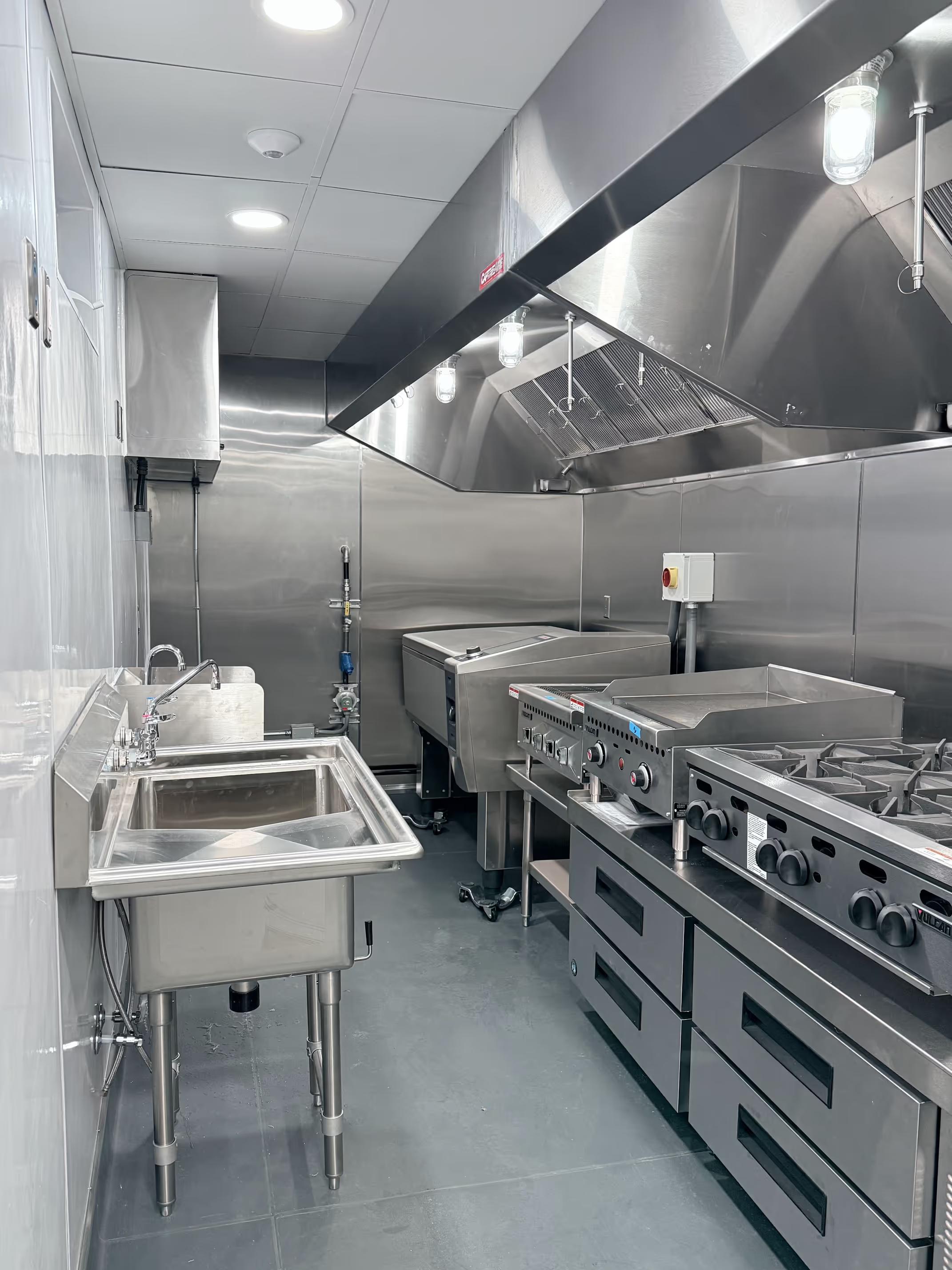
4. Fire Department Inspection
- Issued by: Local fire marshal or fire prevention bureau
- Purpose: Ensures compliance with fire safety regulations under NFPA 96
- Applies to: Any trailer with heat-producing appliances like fryers, ovens, or grills
- Key Requirements: Inspections typically require a Type I or II exhaust hood with baffle filters, a UL 300-rated fire suppression system, propane shutoff valves, proper venting, and gas leak detection. Most jurisdictions also require tagged fire extinguishers and evidence of adequate LPG clearance.
Example: In Houston, Texas, mobile food units must schedule an inspection with the Houston Health Department, which includes fire safety evaluations. These inspections are typically included in the $250 permit package from the Houston Health Department.
5. Commissary Kitchen Agreement
- Issued by: Not a government-issued permit, but a required document for many permits
- Purpose: Establishes your access to a licensed commercial kitchen for prep and sanitation
- Applies to: Vendors whose trailers lack full prep, washing, or waste facilities
- Key Requirements: You must provide a written agreement with a licensed commissary that includes their license number, list of available services (e.g., dishwashing, food prep, storage), and your hours of access.
Example: Miami-Dade County requires a notarized commissary letter on file to approve mobile vendor permits. Commissary agreements typically cost $200–$500 per month, depending on location and services provided.
6. DMV Registration and Vehicle Compliance
- Issued by: State Department of Motor Vehicles or Department of Transportation
- Purpose: Verifies the legal roadworthiness of your mobile kitchen trailer
- Applies to: All mobile food units, both motorized and towed
- Key Requirements: You’ll need to register the trailer as a commercial vehicle, verify VIN and title information, attach appropriate reflectors and license plates, maintain weight-class compliance, and carry commercial insurance.
Note: In California, trailers over 10,000 lbs require a Class A commercial license. Florida mandates regular safety inspections for mobile units. It can be $50–$300 for registration; Class A license training and testing may cost $100–$500+ depending on the state.
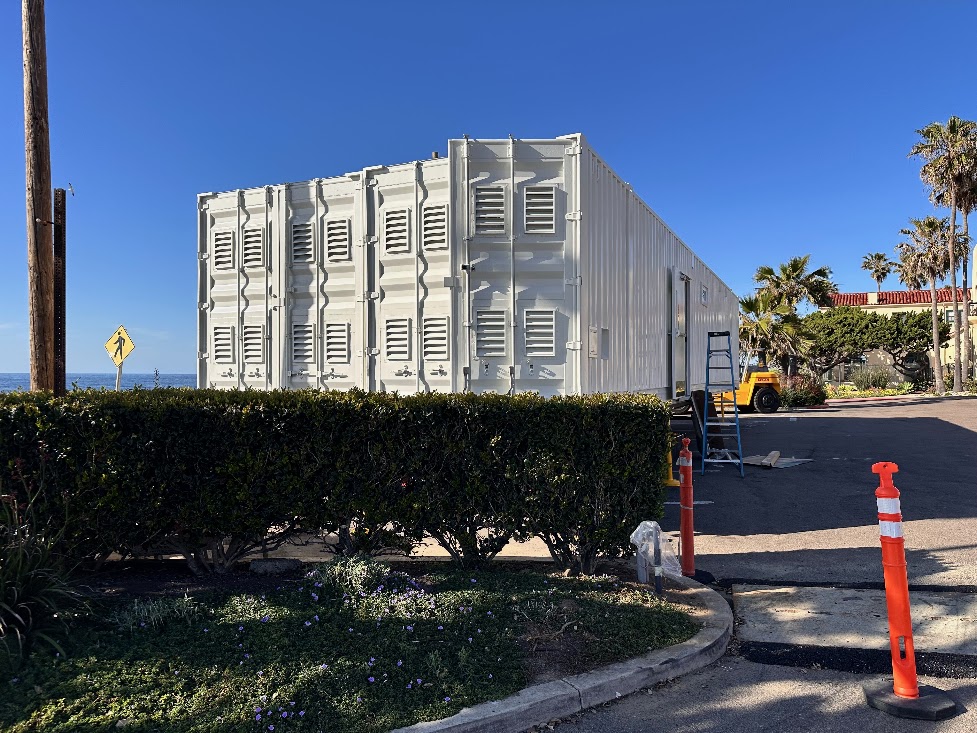
7. Zoning, Parking, and Site-Specific Permits
- Issued by: Local zoning boards or city planning departments
- Purpose: Controls where and how mobile food vendors can legally operate
- Applies to: Vendors operating in public rights-of-way, lots, or designated zones
- Key Requirements: Many cities regulate minimum distance from brick-and-mortar restaurants (often 200 feet), noise levels from generators, trash management procedures, restroom access, and operational hours.
Example: Zoning approval fees vary widely but are often bundled with other permit costs or range from $50 to $200.
Note: New Orleans GIS Mobile Vending Map shows how zoning maps help vendors find compliant locations.
8. Temporary Event, Festival, and Special Use Permits
- Issued by: Local health and event agencies
- Purpose: Grants short-term permission to operate during scheduled events
- Applies to: Farmers markets, fairs, weddings, pop-ups, and corporate catering
- Key Requirements: These permits often include combined fire, zoning, and health inspections for the event site. You may also need to comply with canopy/tent regulations and wear event-specific food handler badges or wristbands.
Example: San Francisco requires a unique TFF (Temporary Food Facility) permit for each individual event, even if you’re fully licensed elsewhere. Fees vary from a county to another and generally start at $100.
9. Waste Management and Environmental Compliance
- Issued/Regulated by: County health departments, local sanitation districts, and EPA-aligned programs
- Purpose: Ensures safe disposal of wastewater, grease, and fuel
- Applies to: All mobile kitchens handling graywater, fats/oils/grease (FOG), or propane
- Key Requirements: You’ll need a valid graywater disposal plan (usually tied to your commissary), grease waste contracts with licensed haulers, backflow prevention documentation for clean water inlets, and propane handling certifications when operating under fire code restrictions.
Example: San Diego County requires food vendors to submit written contracts with licensed grease and wastewater haulers before issuing permits. Waste disposal permits may cost $50–$100, depending on local guidelines.

Timelines for Mobile Kitchen Permit Approval
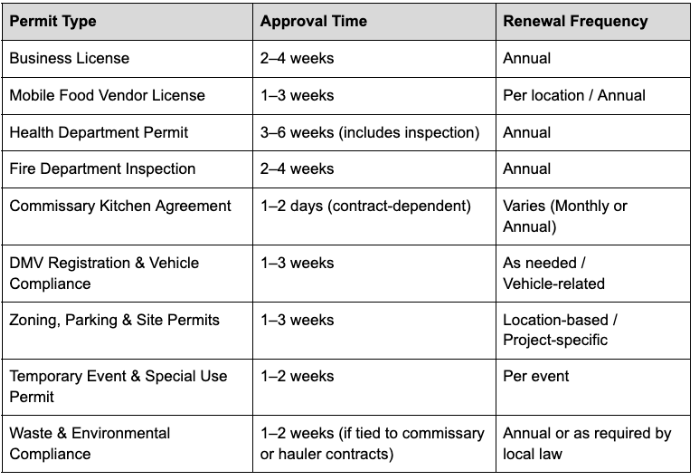
Common Mistakes & How to Avoid Them
1. Applying in the wrong jurisdiction
Permits are often city-specific, even within the same county or state. Submitting to the wrong agency can waste weeks.
Tip: Always verify if the required permit is issued at the city, county, or state level before applying.
2. Ignoring layout and equipment requirements
Health and fire permits may be denied if your trailer lacks properly separated sinks or uses non-certified appliances.
Tip: Review local health and fire codes before buildout to ensure layout and equipment are pre-approved.
3. Skipping the commissary kitchen requirement
Even fully self-contained mobile units may need to list a commissary for cleaning, water refills, and waste disposal.
Tip: Check local code as some counties won’t issue permits without a signed commissary agreement on file.
4. Delaying fire inspections
Fire department approval is often a prerequisite for your health inspection. Delays here can halt your timeline.
Tip: Schedule both inspections as early as possible and confirm if they can be conducted concurrently.
5. Using a non-compliant trailer
Many permitting failures stem from the design of the unit itself, especially ventilation, sink spacing, or propane setup.
Tip: Consider renting a pre-approved, compliant-ready unit like those from Mobile Culinaire to avoid design-based rejections.
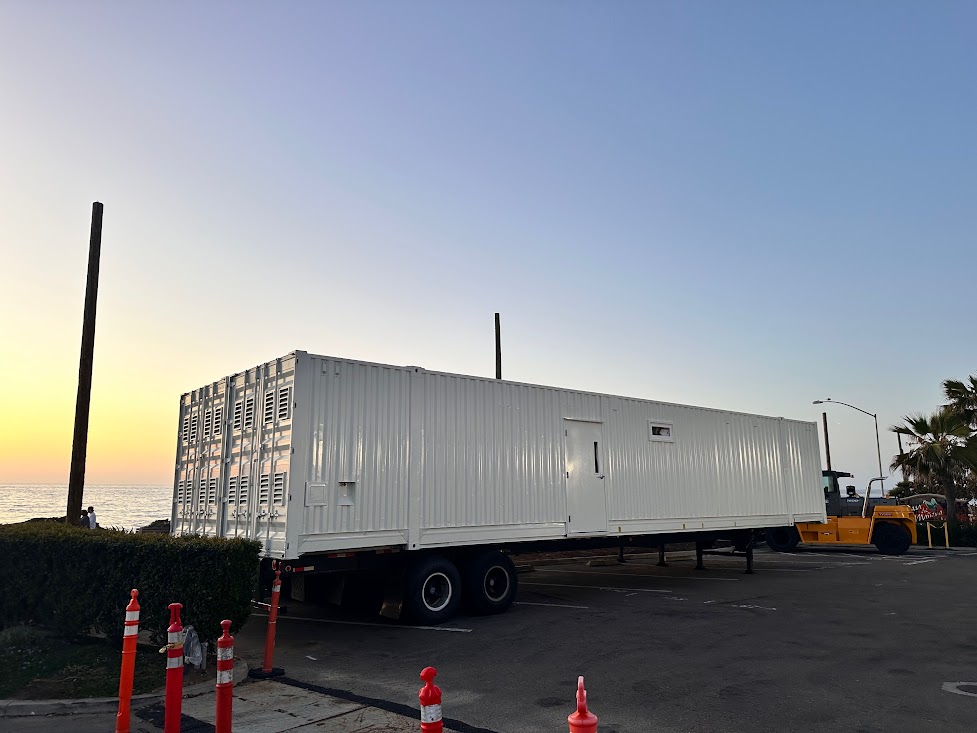
Streamline Permitting with Mobile Culinaire
Permitting delays, contractor coordination, and failed inspections are common when renting generic mobile kitchens. Mobile Culinaire eliminates those barriers by design.
Here’s how we make getting up and running effortless:
1. Built from the Ground Up
We don’t outsource. Every Mobile Culinaire unit is engineered and constructed in-house, based on insights from producing over 400 kitchens nationwide. That hands-on experience means smarter layouts, long-term durability, and fewer points of failure.
The result: You’re not retrofitting a trailer, you’re operating in a purpose-built kitchen that’s been tested in the real world.
2. Delivered Fully Equipped & Turnkey
Our mobile kitchens arrive with commercial-grade appliances, exhaust hoods, HVAC, lighting, and plumbing: pre-installed, pre-wired, and ready to plug in.
The result: You’re cooking in hours, not days. No scrambling for parts. No guesswork. Just instant readiness.
3. Compliant by Design
Mobile Culinaire units are built to meet or exceed national fire, health, and sanitation standards from the start: including NFPA 96 ventilation, UL 300 fire suppression, and food-code-grade finishes.
The result: Faster approvals, smoother inspections, and zero need for costly retrofits.
4. Fast Setup with Minimal Downtime
Our plug-and-play utility systems (water, electrical, gas, waste) are designed for rapid deployment, even in urgent or remote scenarios. Whether it's a one-day event or a months-long renovation, you’re ready to go.
The result: You maximize uptime, shorten setup windows, and protect your revenue stream.
5. Regulatory Expertise
Permitting can be confusing. Our team knows the landscape: local inspection checklists, commissary requirements, fire marshal expectations, and more. We’ll guide you through it all.
The result: Less red tape, fewer rejections, and peace of mind from day one.
6. Flexible Rental Terms
Need a mobile kitchen for a weekend? A month? A year? We structure rental agreements around your timeline, use case, and goals - not around our inventory.
The result: You get a tailored solution with no rigid contracts, minimums, or upcharges.
7. End-to-End Service
From initial inquiry to final pickup, we handle logistics, delivery, setup coordination, and breakdown so you can stay focused on your operations, not vendor wrangling.
The result: One point of contact. No contractor drama. Just a kitchen that works.
%2520(1).jpeg)
Final Thoughts
Securing the proper permits is the single most important step in launching a mobile kitchen trailer. While the process can be complex and time-consuming, each permit plays a critical role in protecting your business, ensuring food safety, and maintaining community trust.
With a clear roadmap and the right guidance, compliance doesn’t have to be a barrier, it can be your launchpad. By planning ahead, staying organized, and choosing a partner that understands the regulatory landscape, you can turn permitting from a hurdle into a strategic advantage.
Explore our fully-permitted mobile kitchens or contact us today to streamline your setup with Mobile Culinaire.
Disclaimer
This guide is for informational purposes only and does not constitute legal advice. Regulations and permit fees may vary depending on your location. Always consult local authorities to verify specific requirements in your area.
People Also Ask (FAQ)
What permits do I need to start a mobile kitchen trailer business?
Most mobile kitchens require a combination of permits, including a business license, mobile food vendor license, health department permit, fire department inspection, DMV registration, and in many cases, a commissary kitchen agreement. You may also need temporary event or zoning permits depending on where you operate.
How long does it take to get all the necessary permits for a mobile kitchen?
Permit timelines vary by location, but most operators should allow 4 to 8 weeks to complete all approvals. Health and fire inspections tend to take the longest, especially in large cities. Using a compliant rental kitchen can reduce delays significantly.
How much does it cost to permit a mobile kitchen trailer?
Total permitting costs typically range from $500 to $3,000 depending on your location, trailer setup, and number of jurisdictions. This includes business registration, health and fire permits, zoning approvals, and event-specific licenses. Costs are often higher in urban areas and for units without prior compliance documentation.
Testimonial

"What is standing out when you look at the mobile kitchen operation is the efficiency that we can really achieve because it's built for that."
Tell us about your kitchen needs and request a quote.
.png)
Turnkey mobile kitchen
.png)
Proudly made in-house in the USA
.png)
Commercial grade kitchen equipment
.png)
Code-compliant
Trusted by Industry Leaders



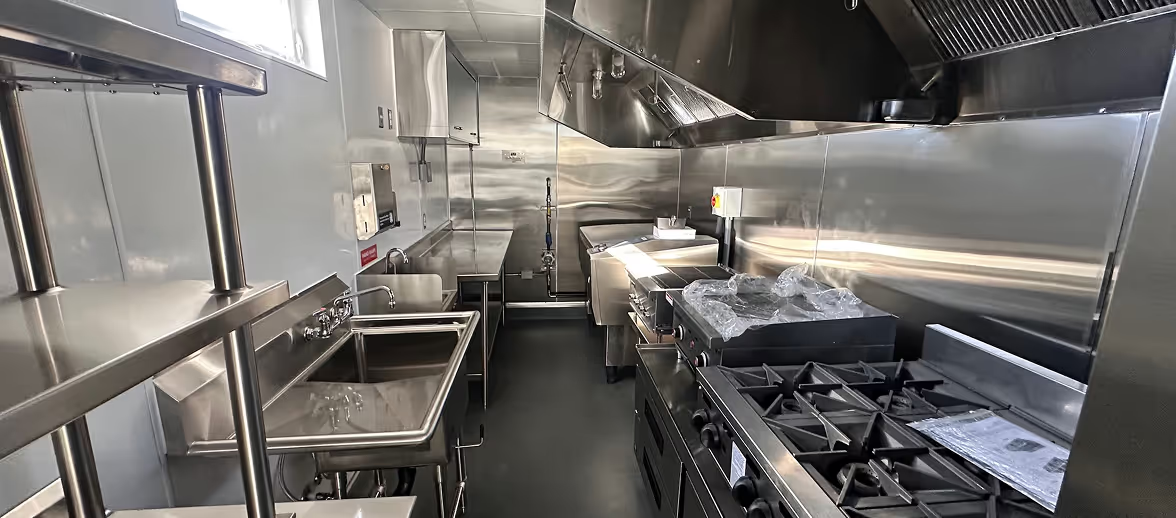
.gif)

%20(1).avif)
%20(1).avif)
%20(1).avif)